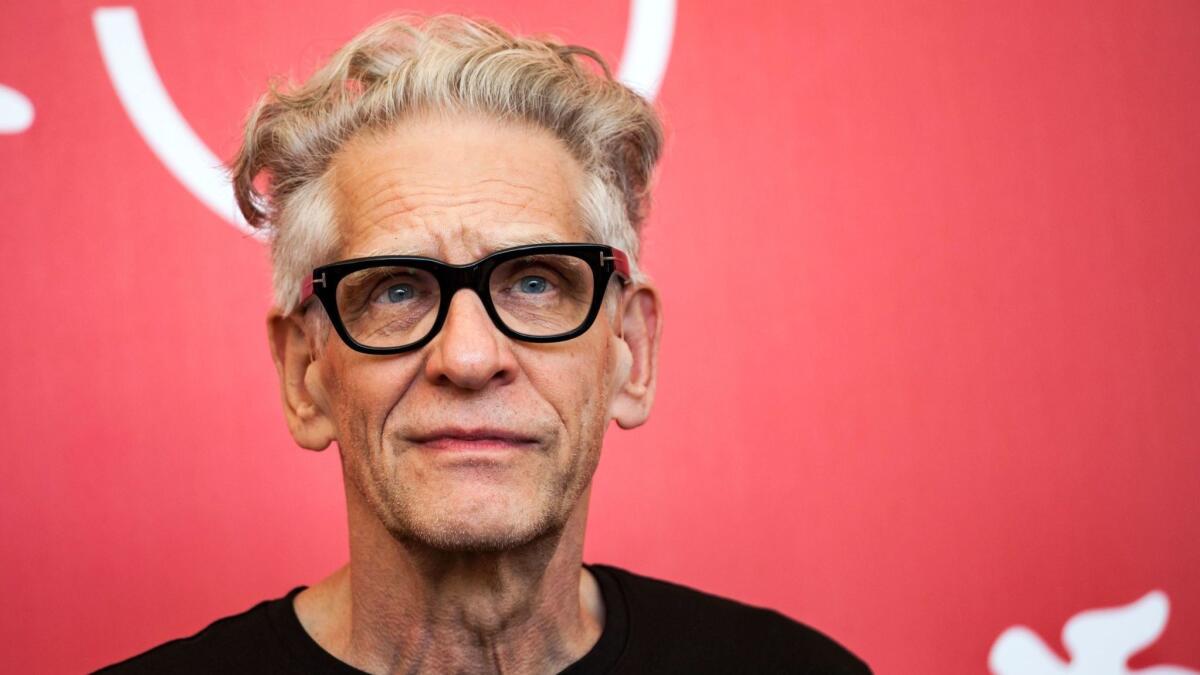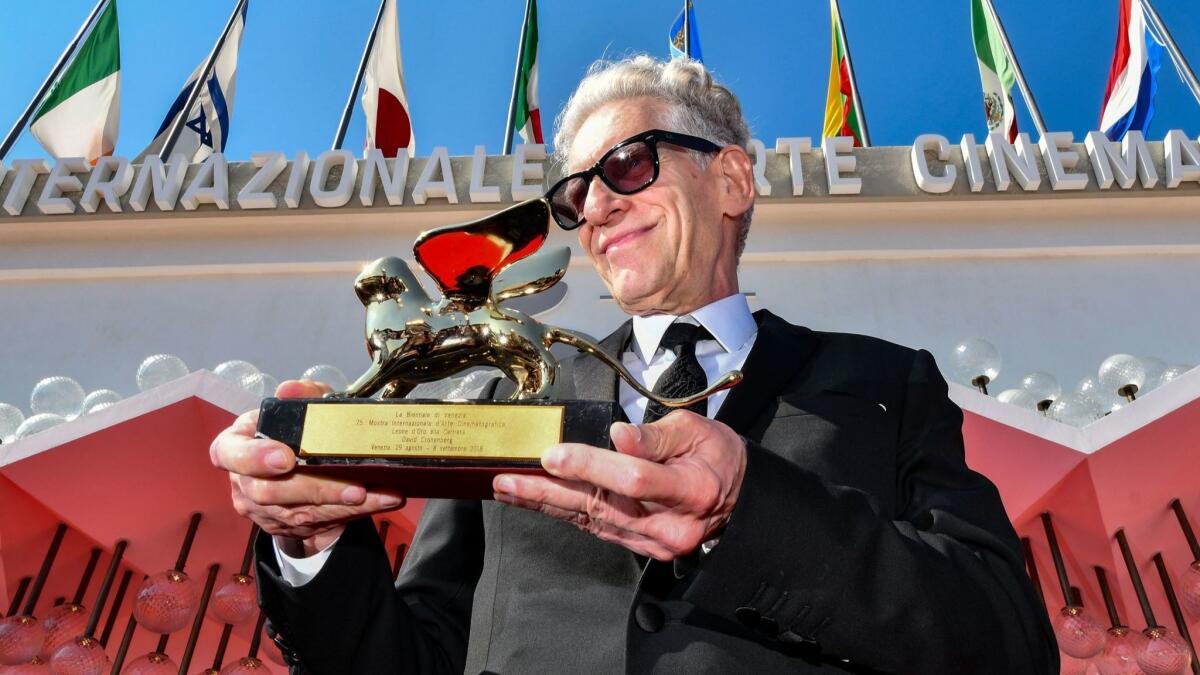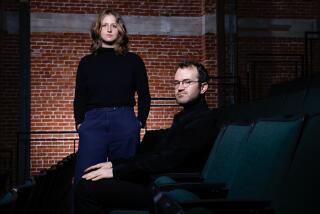Q&A: David Cronenberg returns to L.A. for Beyond Fest tribute

David Cronenberg has a cold. Over the phone recently from his hometown of Toronto, the filmmaker was apologetic for his cough as he talked about the 13-film tribute series — “Cronenberg With Cronenberg: A Retrospective of the New Flesh” — that starts Saturday as part of Beyond Fest. The program also will include a rare series of Los Angeles appearances by Cronenberg, who recently received a special lifetime achievement award at the Venice Film Festival.
To hear the filmmaker known for his idiosyncratic “body horror” movies — with their often disturbing mix of the organic and the technological — grappling with his own virus was somewhat startling. It was also a vivid reminder that at its core, Cronenberg’s work on movies such as “Videodrome,” “The Fly,” “Dead Ringers,” “Crash” and “A History of Violence” has always been very human, tenderly emotional as well as rigorously intellectual.
But don’t relegate Cronenberg to the tribute circuit just yet. He published his first novel, “Consumed,” in 2014 and has publicly and pointedly expressed an interest in long-form television work while also refusing to turn his back on feature films — although he hasn’t made one since 2014’s “Maps to the Stars.” Asked what he’s doing next, Cronenberg gave an all-too-human answer: “Well, I’ve made a lot of notes, and I’m not sure. ... You never know. Depends how lazy I am.”
You recently said that you don’t actually go to the cinema much anymore, that you mostly watch things at home. But the Beyond Fest series sold out very quickly and there will be many people coming together to watch your movies. For you, is there some distinction between those experiences — between watching something at home on a big, modern television and going to have that communal experience in a theater?
Well, Beyond Fest will be different because it’s fans of my work coming together, which is not the same as a normal commercial screening. So that has a special buzz, no question about it. But I really have not found the theater experience to be all that great, frankly. I saw Guillermo [del Toro]’s film “Shape of Water” on a Blu-ray at home and then a friend wanted to go see it, so I went with her to the theater and the picture was very dark for some reason. There were commercials, there were people looking at their phones, but the actual physical presence of the film on-screen, it was very dull. So I have to say, as a filmmaker, I would rather have had people see it in my house where the color was right than in that theater in Toronto. … You actually can control it better at home.

And, yes, of course there’s the social aspect of going to the cinema. I was on a panel with Spike Lee and some other filmmakers in Venice discussing the future of cinema and there was a lot of discussion about the sacred, cathedral-like communal religious experience of cinema and in theaters. I’d been seeing movies probably longer than any of the other people on the panel, and I didn’t have that wonderful flush of religious feeling when we’re thinking about cinematic experience. Spike Lee was talking about moments in “The Exorcist” and things where the audience would scream. And there are those moments. But I really had to say to them, I would be happy watching “Lawrence of Arabia” on my Apple Watch. It would be an experience.
But you do still believe in moving-image storytelling? Whether it’s as long-form television or as cinema, a movie, are you still excited about the possibilities of visual storytelling?
Yes, definitely. That’s the thing that kind of gets lost when people are trying to compare the various ways you might be able to watch a movie or a TV series. And that’s why I talked about Netflix a lot, beginning with that panel with Spike, because if you’re going to talk about the future of cinema you have to talk about Netflix and the phenomenon of streaming services in general because that is an incredibly new and disruptive paradigm. And I really think that that is the future of cinema.
Beyond Fest is a genre-oriented festival, and your earlier work is more obviously related to genre and in your more recent films that connection has become more submerged. Do you feel like your relationship to genre has changed over the years?
Yes. I did think, “OK, if I do Beyond Fest, I’m really embracing my roots as a horror filmmaker, as a genre filmmaker.” And I have no problem with that at all. It’s not like I’ve been trying to get detached from that. Genre really did get me an entree into filmmaking. In Canada it was very difficult to have an entree into filmmaking because there wasn’t any going on, except maybe at the CBC and the National Film Board. I owe genre filmmaking a lot, particularly the horror genre, and this will be fun to dive back into that murky pool and splosh around in it with the fans.
I must say that the Beyond Fest people, they have gone beyond. I think they’re showing 13 of my films, which means that they’re not just showing the early genre pictures. So they’ve really made an effort to really cover the territory. I’m very impressed by that.
I did think, ‘Okay, if I do Beyond Fest, I’m really embracing my roots as a horror filmmaker, as a genre filmmaker.’ And I have no problem with that at all.
— David Cronenberg
In some of your more recent films, especially in “A History of Violence” and “Eastern Promises,” there is an awareness of genre, but I don’t know how you would classify “A Dangerous Method” or “Cosmopolis” or “Maps to the Stars.” What is your relationship to genre in your recent work?
I don’t pay attention to it, actually, because you get movies like the ones you mentioned or “Dead Ringers” — they’re not classifiable, unless you worked very hard, as genre films. In my early days, genre protected me. When I was making horror films it was understood that you could do things within the genre that maybe would not have been acceptable in more polite dramas. After my first five or six films, I wasn’t really thinking about it.
And even when I did movies like “Eastern Promises” and “History of Violence,” which you could classify as thrillers or mob movies or crime stories — of course I’m aware of all of those genres, just having seen a lot of movies in my life — but you really focus on making the actual project work well on its own. Ultimately when you’re making the movie, all those sort of theoretical things melt away and you’re left there with your actors and your crew trying to make the movie work. At that point genre’s not relevant.
I know that the term “body horror” is not one that you assigned to your own work, but it is the way that so many people talk about your films. I can’t help but wonder if your ideas about our relationship to our bodies have changed as you yourself have gotten older?
It’s just gotten more horrible. Honestly, life has only confirmed what I kind of intuited as a young person, let’s put it that way. I know a lot of people who have died. I think I know more dead people than living people. So of course it becomes a philosophical and for me an existential question — what is life, what is the human condition, what’s it all about? And for me it is the body, it is physical. That’s what we are, and that carries with it the acceptance of our own mortality and so on and so on. I don’t think that aspect of what’s in my head thinking about human existence and the human body — that hasn’t really changed at all.
Hardly a day goes by without the exploding head in “Scanners” popping up in my social media feeds and I see that image. How do you feel about something like that being taken out of context of the movie — it’s now just the ultimate exploding head?
Well, I’d like it to be the ultimate exploding head — why not? And it has great metaphorical value even when you take it out of context. A lot of people, especially these days, have felt like their heads are exploding. If it gives you a little relief to see somebody else’s head exploding, then that’s probably a good thing.
--------------
‘Cronenberg With Cronenberg: A Retrospective of the New Flesh’
Where: Egyptian Theater, Hollywood; Aero Theater, Santa Monica
When: Sept. 29-Oct. 1
Info: beyondfest.com
Follow on Twitter: @IndieFocus
More to Read
Only good movies
Get the Indie Focus newsletter, Mark Olsen's weekly guide to the world of cinema.
You may occasionally receive promotional content from the Los Angeles Times.







